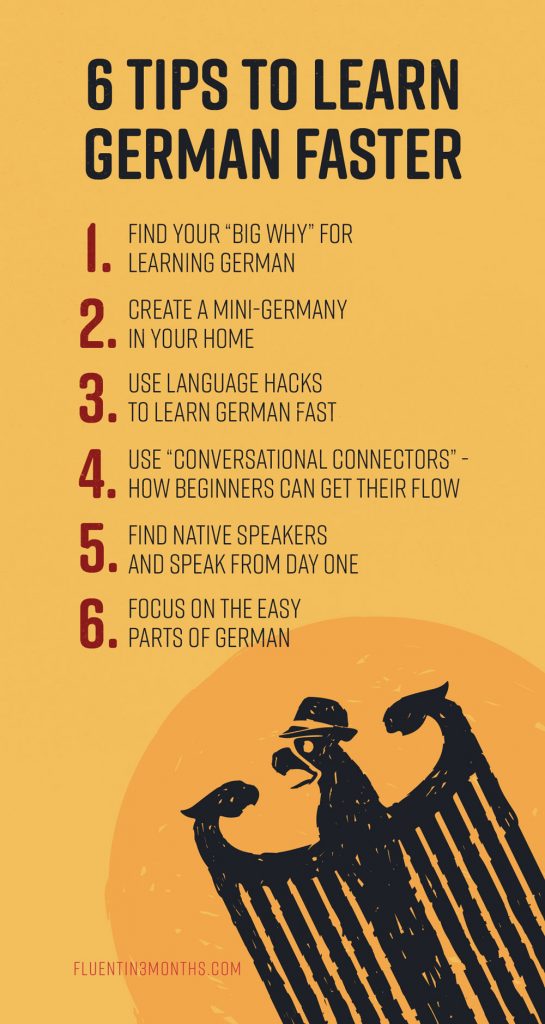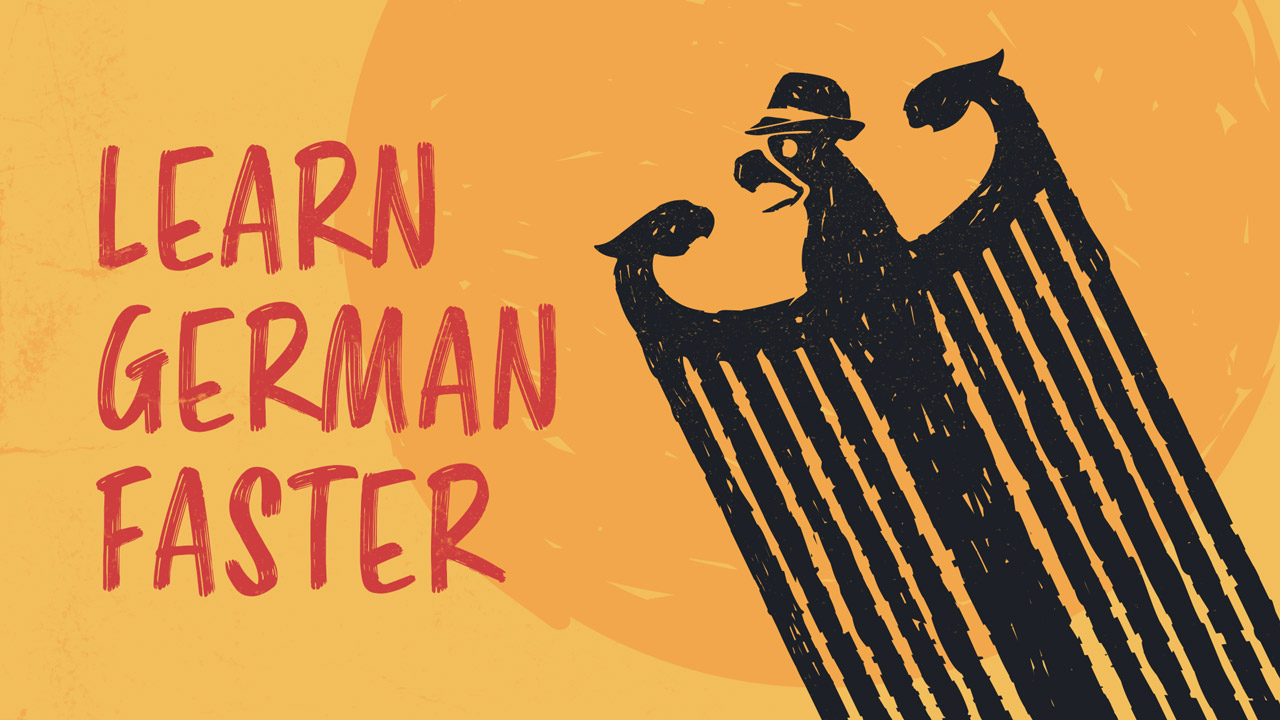How to Speak German: The Faster Way to Learn German

One of the most common questions I’m asked is: “What’s the best way to learn German?” Or, another variation: “What language hacks will teach me how to speak German with ease?”
Well, I’m going to teach you just that.
In my travels around the world and my conversations with language learners I've noticed that the German language is often seen as difficult.
Yes, German vocabulary is gendered. Yes, there are some really long words to learn. And yes, the grammar isn't always intuitive.
But there's plenty about German that is easy too.
I'd like to share six steps to help you learn how to speak German.
This is the language hacker's approach to learning German, so give these steps a try and you'll be speaking German faster than you ever thought possible.
Here’s what we’ll be covering:
Table of contents
- Step 1: Find Your “Big Why” for Learning German – Reason and Passion
- Step 2: Create a Mini-Germany in Your Home – Immersion without Travel
- Step 3: Use Language Hacks to Learn German Fast – Work Smarter
- Step 4: Use “Conversational Connectors” – How Beginners Can Get their Flow
- Step 5: Find Native Speakers and Speak from Day One
- Step 6: Focus on the Easy Parts of German
- Learn German and Become a Confident Speaker, Fast
Step 1: Find Your “Big Why” for Learning German – Reason and Passion
Lesson: Ask “Why” First – NOT “How/What”
Even before you think about which materials to study, or your method for learning German, you need to take a step back and understand your underlying reason for wanting to speak German.
This is your Big Why.
My “Big Why” is an unquantifiable passion for languages. It isn't something measurable like “So I can speak to X number of people in the world”, but it has to do with enriching my life with friendships and experiences, which you can't really measure.
Here are some reasons for learning German that could be your “Big Why”:
- To have conversations with German speaking family members, or to teach your kids German
- To find a job in a German company (Germany is one of the biggest economies in the world)
- To speak with natives as you travel in the heart of Europe
- To read the classics of German literature (think Johann Wolfgang von Goethe, Herman Hesse and Franz Kafka)
- To enjoy German TV shows
- To get an inside view of German culture
Find your “Big Why” and you'll discover that learning German becomes a challenge you'll love.
Related resources: German for kids, How I learned fluent german in 10 months and lived in germany for free, 10 must-watch German TV shows
Step 2: Create a Mini-Germany in Your Home – Immersion without Travel
Lesson: Creating an Immersion Environment for Home, Work, or Play (Helpful for all languages!)
You don't need to live in Germany to immerse yourself in the German language. There are many ways to plunge yourself headfirst into German wherever you live.
Here are a few of my top ways to bring Germany to your hometown:
- Make your computer multilingual. Why not turn your computer into a German-only system?
- Find the German speakers in your city. Believe it or not, there are many communities of German speakers around the world. You may be near one and not even realize it!
- (If you can’t find speakers near you, you can turn to AI German tutors on platforms like Teacher AI, where you can even chat with an AI version of me in German!)
- Watch German television and movies. Force yourself to focus by watching without subtitles.
- Read articles and books in German. LingQ is a helpful tool for doing this.
- Listen to German music and podcasts. One of my favourites is GermanPod101.
Not sure whether this approach is for you? Read more about how I learned Japanese while living in Spain and Egyptian Arabic while living in Brazil.
If I did it with Japanese and Arabic, I’m sure you can learn German this way!
Related resources: German games to practice your German skills, Free online German language lessons and resources
Step 3: Use Language Hacks to Learn German Fast – Work Smarter
Lesson: Language Hacking German: 10 Hacks to Learn German Faster
Language hacks are shortcuts that help you learn a language faster.
Here are a few of my favourite language hacks that can help you learn German fast:
- Use Spaced Repetition Systems (SRS). SRS is a great method for memorizing vocabulary and phrases. It’s probably the most effective hack you can use to pick up new vocabulary.
- Use mnemonics. Mnemonics help you create associations to easily recall German words. The key to mnemonics? Use your imagination.
- Focus your study with the Pomodoro Technique. This technique allows you to break up your study sessions into smaller chunks of time resulting in better focus and a more effective learning experience.
Related resources: A step-by-step guide to your first month learning German, motivational German quotes
Step 4: Use “Conversational Connectors” – How Beginners Can Get their Flow
Lesson: Conversational Connectors: How to Fake Having a Conversation Just After Starting to Learn a Language
Like most languages, German uses a set of call and response phrases that I call conversational connectors. These are crucial to everyday conversations, but they aren't usually found in phrasebooks.
When my friend Anthony Lauder introduced me to conversational connectors a few years ago, they blew my mind.
They're a great technique for sounding more like a native speaker, for removing the awkwardness from conversations, and for giving yourself time to recall vocabulary.
Here's an example of how they work.
When someone asks you “How is your hotel room?” instead of answering with “um … good”, which pretty much ends things right on the spot, you might add in phrases and expressions to create a more organic feel to what you are saying.
You could say: “To tell the truth, that is a good question. The hotel room is good. Thanks for asking. How is your hotel room?”
This is exactly the same answer with conversational connectors added in.
Conversational connectors are extremely helpful because you can use them in a variety of situations such as agreeing with someone, sharing your opinion, or changing the subject.
Here are a few examples in German:
- Um ehrlich zu sein – “To tell the truth”
- Meiner Meinung nach – “In my opinion”
- Leider – “Unfortunately”
- Zum Beispiel – “For example”
- Übrigens – “By the way”
Related resources: 25 fun German interjections, German slang
Step 5: Find Native Speakers and Speak from Day One
Lesson: Speak from Day One
To improve your German quickly, you must speak from the very first day you start learning German.
This Speak from Day One approach is the fastest and most efficient way to learn German – especially if you speak with native German speakers.
No matter where you live you can still find people, either online or offline, to speak with in German. I connect with German speakers by:
- Browsing italki. italki is my go-to place to find native German speakers. The prices are reasonable (especially compared to private, face-to-face lessons) and you can meet in the comfort of your own home. Plus, italki has a nice selection of tutors that can help you learn German.
- Meeting up with German learners. On MeetUp.com you can find weekly German meetups in many major cities around the world. I've also been successful using CouchSurfing to connect with German learners and native speakers.
- Installing the HelloTalk app on my smartphone. This handy language-learning app helps you connect with other language learners around the world and is a great place to practise speaking German.
You may also like to join my Speak in a Week crash course to give yourself a huge boost in confidence at speaking German after just seven days. It's free!
The best way to begin speaking from day one is simply learning how to say “hi”! A few German greetings you can use:
- “Hello” – Hallo
- “Good day” – Guten tag
- “How are you?” – Wie geht es dir?
Related resources: German greetings, 30 ways to start a German conversation
Step 6: Focus on the Easy Parts of German
Lesson: Why Learn German? 10 Good Reasons to Learn German
When learning German, the trick is to focus on those parts of German that are easy to pick up.
German is an easy language to learn because it has:
- No tones, as there are in Chinese or Thai
- No liaisons between words, as there are in French
- Many of the same letters as English, unlike Japanese or Korean
- No postposition or preposition suffixes, like in Hungarian or Turkish
- No strings of difficult-to-pronounce consonants like in Czech.
Plus, German is a phonetic language. This means that (with very few exceptions) you know exactly how to pronounce a word when you see it spelled. Likewise, when you hear a word you can almost always write it out.
On top of that, many parts of German grammar are the same as English since they are both part of the Germanic family of languages. Older Anglo-Saxon texts are particularly close to the German language. Even more recent classics, such as Shakespeare, are closer to the German roots of English.
Another way of looking at this is to ask yourself, “How would Shakespeare have said it?” For example, “thou” is not far from German's “du“.
Likewise, “thine”, is very similar to “dein” in German.
There are many more ways that German is actually really easy, so be sure to check out my guide “Why German is Easy” where I explore this in a lot more detail.
Related resources: Beginners’ German reading practice, 5 common mistakes learning German, and how to fix them
Learn German and Become a Confident Speaker, Fast
There are many ways to study German that accelerate your learning.
Just remember these important steps:
- Find your “Big Why” for learning German
- Immerse yourself in the German language by creating a Mini-Germany in your home
- Make smart use of language hacks
- Use conversational connectors to sound fluent and buy yourself time
- Speak from day one – especially with native speakers
- Realise that German is much easier than you think
And if you're looking for a fun, structured German course I recommend you check out GermanPod101. It's one of my favourite ways to learn German!
Conversational fluency in German is just around the corner! And now you have the tools to help you make the most of your German studies.




Social